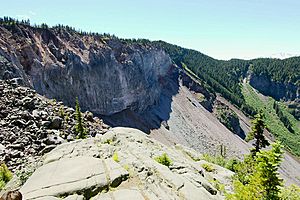The Barrier facts for kids
Quick facts for kids The Barrier |
|
|---|---|

The rock fall area and the edge of The Barrier
|
|
| Official name | The Barrier |
| Location | British Columbia, Canada |
| Coordinates | 49°56′06″N 123°04′48″W / 49.9349°N 123.0800°W |
| Dam and spillways | |
| Type of dam | Lava dam |
| Impounds | Rubble Creek |
| Height | 243 m (800 ft) |
| Length | 2.4 km (1.5 mi) |
| Spillways | 1 |
| Spillway type | Uncontrolled |
| Reservoir | |
| Creates | Garibaldi Lake |
| Surface area | 9.94 km2 (3.84 sq mi) |
| Maximum water depth | 258.7 m (849 ft) |
| Normal elevation | 1,484 m (4,869 ft) |
The Barrier is a natural wall made of hardened lava in British Columbia, Canada. It holds back the waters of Garibaldi Lake. This huge wall is more than 300 m (980 ft) thick and stretches for about 2.4 km (1.5 mi) where it keeps the lake in place. Because The Barrier is made of old, unstable lava, the area around and below it needs to be carefully watched.
How The Barrier Was Formed
The Barrier was created about 9,000 years ago. Large amounts of hot, melted rock, called lava, flowed from a volcano named Clinker Peak. This peak is on the side of Mount Price.
The lava flowed towards the Cheakamus River valley. At that time, the valley was filled with a huge glacier (a large sheet of ice). The flowing lava hit the ice and stopped, forming a big pool. As it cooled down, it became a solid wall of rock.
When the glacier eventually melted away, the part of the lava flow that had been touching the ice became a very steep cliff. Water then collected behind this new lava wall, forming the beautiful Garibaldi Lake.
The Rubble Creek Boulder Field
The Barrier is made of lava that isn't very stable. In the past, pieces of it have broken off and slid down the mountain. These events are called debris flows. They send a mix of rock, soil, and water rushing downhill.
The most recent big landslide happened around 1855-1856. This event created a large area covered in rocks and boulders. This rocky area is why the nearby stream is now called Rubble Creek. During that landslide, at least 30,000,000 m3 (1.1×109 cu ft) of rock broke away from The Barrier.
Safety and The Barrier
People have been concerned about The Barrier because it could become unstable. This could happen due to volcanic activity, earthquakes, or very heavy rainfall. Because of these worries, the government decided in 1981 that the area directly below The Barrier was not safe for people to live in.
This decision led to the small village of Garibaldi being moved. Residents had to relocate to new areas away from the danger zone. If The Barrier were to completely collapse, all the water from Garibaldi Lake would rush out. This would cause a lot of damage downstream in the Cheakamus River and Squamish River valleys.
The town of Squamish could be severely affected. There might even be a large wave in Howe Sound that could reach as far as Vancouver Island.
See also
 In Spanish: La Barrera para niños
In Spanish: La Barrera para niños
 | Claudette Colvin |
 | Myrlie Evers-Williams |
 | Alberta Odell Jones |

